Causes
These shoes are made for walking: African penguin receives custom footwear at New England Aquarium

BOSTON, MASS. – After more than two years receiving specialized care for a foot condition, a penguin at the New England Aquarium is thriving thanks to an innovative and specialized care plan that has included custom footwear, enrichment training, and intensive medical treatments.
“Beach Donkey” is a 24-year-old African penguin who hatched at the New England Aquarium on April 21, 1998. In the summer of 2020, Animal Care staff diagnosed Beach Donkey with pododermatitis, also known as bumblefoot, due to large calluses that had developed on her feet. Pododermatitis is a common condition that affects both wild penguins as well as those in human care and may be associated with numerous factors, including body weight, activity level, age, environment, and genetics. If left untreated, the condition can lead to infection of the bone. The Aquarium’s team of veterinarians and aquarists immediately began developing a care plan.
“Chronic pododermatitis can progress to a deeper infection of the underlying soft tissue structures and bone and can also predispose the bird to other health issues,” said Dr. Melissa Joblon, an associate veterinarian at the Aquarium. “Early diagnosis with routine foot checks, followed by intensive treatment, requires extensive collaboration with the veterinary and husbandry teams.”
Beach Donkey’s care team decided on a multi-faceted treatment plan including a combination of medications, surgical procedures, hands-on foot treatments, and the use of custom-made footwear. Providing her with this level of care meant first getting the bird comfortable using enrichment and behavioral desensitization.
“Training an animal to be comfortable with this level of interaction and treatment requires very small steps and a positive trainer-animal relationship,” said Eric Fox, the Aquarium’s Manager of Penguins. “Nuanced understanding of each individual penguin and what they find reinforcing is crucial to a trainer’s success and is essential to the health of each penguin.”
As an incentive for allowing Animal Care staff to handle her feet, Beach Donkey went on field trips throughout the Aquarium, enjoying “novel views” from exhibit halls to staff offices.
“We wanted Beach to continue to come to her feeds on exhibit, so we considered other ways to reward in addition to giving her fish. She has always been a curious bird and seemed to really like the opportunity to explore the Aquarium, outside of her exhibit space. Of course, our staff also loved when she would make appearances in unexpected places,” said Senior Penguin Trainer Amanda Barr.
As Beach Donkey grew accustomed to her shoes, received foot treatments, and had a successful molt, she was able to undergo another foot surgery. The procedure involved a bandaging process over the course of several weeks that incorporated her shoes and allowed her feet to heal well enough to handle hard surfaces. Since then, her condition has improved significantly. She is now considered healed from bumblefoot, and Animal Care staff will continue with preventative care measures.
Beach Donkey is identified by the green and white bracelet on her right wing. At age 24, she is one of many penguins at the New England Aquarium who have far exceeded their life expectancy of 10 to 15 years in the wild. The majority of the Aquarium’s penguin population is considered geriatric, meaning birds may require special attention and medical care including daily eye drops, acupuncture, and physical therapy. The Animal Care team is putting together a proactive behavior plan for each geriatric penguin that focuses on the animals voluntarily participating in their own healthcare, ensuring the best possible wellbeing for their entire lives. This involves working with the entire colony of penguins to get each bird comfortable with human touch in case a health issue was to arise.
African penguins are an endangered species. Colonies along the coasts of South Africa and Namibia are threatened by the depletion of food from overfishing, climate change, and pollution. In the last two years, the African penguin population has declined by 23%, with the number of breeding pairs a particular concern. The New England Aquarium participates in the African Penguin Species Survival Plan through the Association of Zoos and Aquariums (AZA), which supports field conservation efforts and a thoughtful breeding program to help promote a sustainable future for these penguins. The AZA’s African Penguin SAFE (Saving Animals From Extinction) program unites its member zoos and aquariums, along with a coalition of South African organizations, to ensure that the African penguin does not go extinct by 2035.
-

 Community6 years ago
Community6 years agoNational Shrine of La Salette Festival of Lights 2017 set to begin
-

 Community6 years ago
Community6 years agoMassachusetts State Police looking for good home for retired dogs
-

 Crime6 years ago
Crime6 years agoFall River ranked most dangerous city in Massachusetts according to report
-

 latest6 years ago
latest6 years agoDurfee student allegedly overdoses on marijuana
-

 Community6 years ago
Community6 years agoVideo of Fall River Police goes viral
-

 Causes6 years ago
Causes6 years agoMissing Fall River woman found deceased
-

 Crime6 years ago
Crime6 years agoFall River Police add names to most wanted list
-

 Causes6 years ago
Causes6 years agoFall River teenager reported missing has been found



